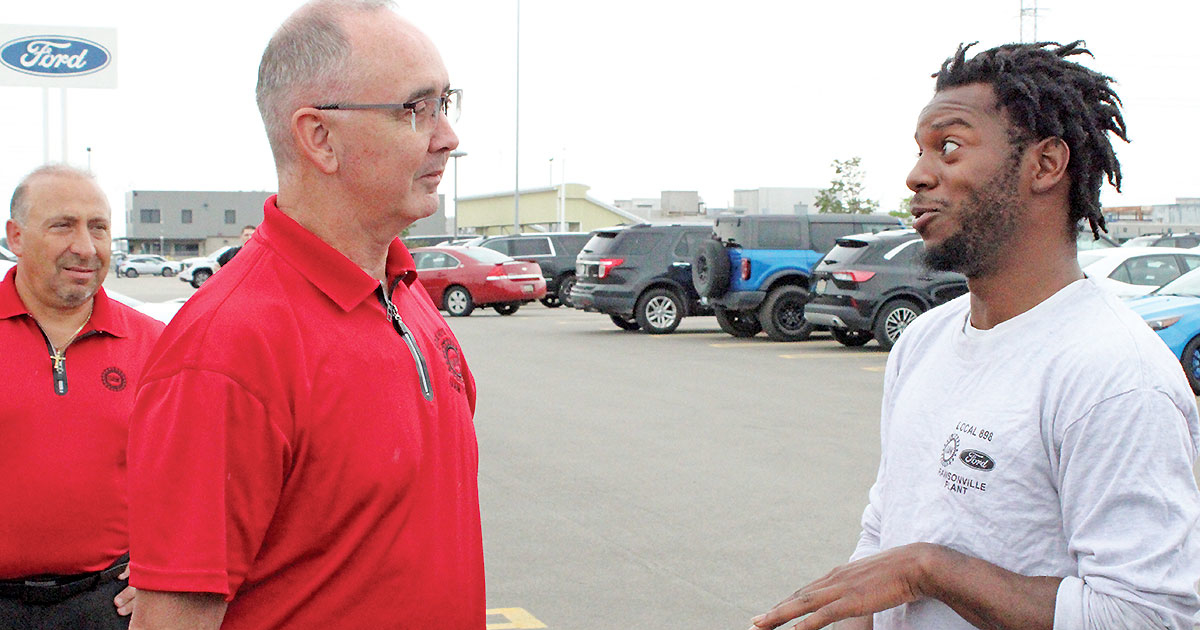
Within weeks of his election, UAW President Shawn Fain promised a revolution in communication as the union prepared to enter contract negotiations with the Detroit 3. As those talks have ramped up over the past month, that promise has been put to the test.
Fain has promised a members-first approach to bargaining with increased communication and improved transparency as core tenants of the strategy.
Already, the union leader has shined a spotlight on the bargaining process, illuminating what are usually closed-door proceedings by publicizing the UAW’s demands and dramatically trashing one automaker’s proposals on a social media livestream. His vice presidents and bargaining teams also have posted regular video updates and photos of the process.
Aside from informing the membership, Fain is attempting to rebuild trust among the rank and file after the corruption scandal that sent two former presidents and other high-ranking officials on both sides of the bargaining table to federal prison.
His most recent predecessors, Rory Gamble and Ray Curry, never fully repaired that damage and failed to connect with the wider membership.
“Strong communication is the key to building solidarity,” Fain said July 11 on Facebook Live.
The UAW made a major social media push in the run-up to negotiations, posting more than 100 video clips across various platforms since March. Fain held the union’s first virtual town hall on Facebook in May and has been periodically livestreaming updates on the platform.
The UAW’s Facebook and Instagram accounts have seen followers increase by two-thirds, according to a union source. Fain’s July 11 Facebook Live video has been viewed more than 20,000 times and has received 1,600 comments.
Fain visited assembly plants in the Detroit area, foregoing ceremonial handshakes with Detroit 3 executives that traditionally began bargaining.
Visiting members to kick off contract talks “is exactly what [Fain] said he was going to do,” said Charles Taylor, a member of UAW Local 898 in Rawsonville, Mich., who attended one of the gatherings. “That action and initiative is huge for me,” he said.
The UAW also has revamped its internal membership publication, Solidarity Magazine, and launched a web page where it has promised to post updates from Detroit 3 bargaining.
Bill Bagwell, a member of UAW Local 174 in Livonia, Mich., said the lack of communication from previous leadership set a standard of distrust, one that he believes caused the union to lose membership over the years. UAW membership has been declining since it peaked at 1.5 million in the 1970s. It’s currently about 400,000.
“You only got to talk to [representatives] when they wanted to talk to you, and you only got to hear what they wanted to tell you,” Bagwell said. “You couldn’t ask the hard questions.”
Bagwell said Fain’s administration has replaced that standard with one of honesty, a change driven by the union’s use of social media.
“Shawn is on Facebook Live on a regular basis, and he has to answer the tough questions,” Bagwell said. “He answers the questions from the average guy, not just the ones that he wants to answer.”
Bagwell also appreciated that the union solicited contact information from rank-and-file members to facilitate direct communication from leadership during negotiations.
“It also allows us to be part of the decision making,” Bagwell said. “They ask us what we think, they ask us how it is going to affect us, they ask our opinion, and they actually listen to us.”
Douglas Emerick, a member of UAW Local 897 in Buffalo, N.Y., has recently become more involved in union matters. He keeps up with union activity on Facebook but wishes there was also a private, centralized platform for communication.
“The Facebook page is public,” Emerick said. “I would like better communication that cannot be monitored by the company.”
Emerick also said he values opportunities to talk with other union members in person. Online platforms “have gotten me to where I am knowledge-wise, but talking to people face-to-face is the best,” he said.
Scott Houldieson, a member of UAW Local 551 in Chicago and founding member of the union’s Unite All Workers For Democracy reform caucus, said communication from previous leadership was “atrocious.”
That disconnect was felt strongly in 2019, when around 46,000 UAW workers went on strike for 40 days against GM.
“Workers were on the picket line, knowing what their demands were but hearing absolutely nothing during the entire strike,” Houldieson said. “It was an information blackout from beginning to end.”
Houldieson expected current leadership to be more transparent heading into the Detroit 3 negotiations but was surprised to see Fain offering updates about what had been said at the bargaining table.
That change will be a key piece of leverage as negotiations continue, Houldieson said. Asking members how to contact them extends this leverage to everyone, he added, including those who don’t have the time or energy to monitor updates on Facebook.
“Let’s be clear, the negotiators at the bargaining table’s power comes from the members behind them,” Houldieson said.